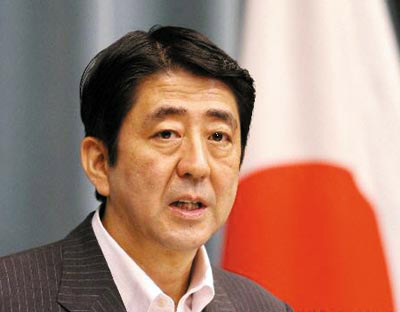Bumpy road ahead for Japan's new PM Shinzo Abe
- By Huang Xingyuan
 0 Comment(s)
0 Comment(s) Print
Print E-mail China.org.cn, January 2, 2013
E-mail China.org.cn, January 2, 2013
In the Japanese general election on Dec. 16, 2012, the Liberal Democratic Party of Japan (LDP) regained control of the government after being defeated by the Democratic Party of Japan (DPJ) for three years straight. Nine days later, Shinzo Abe unveiled his cabinet line-up. Will this end the crisis Japan is undergoing or simply open another Pandora's Box? The world will have to wait and see.
 |
|
Japan's new PM Shinzo Abe |
The domestic economy and relations with neighboring countries are Abe's two top priorities. If he can properly handle both issues, LDP's return to the political arena will benefit Japan as well as other countries in the world.
Is Abe sufficiently competent to complete these tasks? Unfortunately, from what he told journalists after LDP had won the election, one cannot take much inspiration from his words, but will rather discover something relatively more worrisome. On a positive note, Abe later announced he would postpone stationing government officials on the Diaoyu Islands, which, to some extent, helped ease tensions between Japan and China.
Abe and his new cabinet are left with a struggling domestic economy and the worst ties with neighboring countries Japan has seen over the past years. Yet they also face great opportunities: LDP will earn much credit if it can solve either of the two issues.
What Abe must pay attention to is that after 20 years of slow development, great changes have taken place in Japan's political circle. It's no longer appropriate to describe the right-wing conservatives as a mere "handful of people," and it's not only the right-wing media that are demanding a revision of the pacifist constitution.
Will Abe be a real statesman and leave interferences behind him? I might have some suggestions.
On a first note, the Japanese economy is suffering from structural problems. Copying the U.S. quantitative easing policy will not solve the crisis permanently. Before finding a sound solution, the best thing Japan can do is to seek benefits from China's economic growth. Damaging relations with neighboring countries is definitely not a wise road to take.
Japan must be aware that distant water can't quench present thirst. The alliance with the U.S. is important, but it won't protect Japan from emergencies. The Japanese government should balance its relations both with the U.S. and with its Asian neighbors. The nation ought to immediately mend the ties with China, South Korea and Russia, and cooperate with neighboring countries to maintain peace within the Asian Pacific region. By doing so, Japan can safeguard itself and at the same time exercise an influence on the world.
Furthermore, a true statesman will not regret doing things that only later prove to be correct. During his last term, Abe didn't leave behind too much political heritage, but his decisions to not visit the notorious Yasukuni Shrine and pay an ice-breaking visit to China impressed a lot of people. These show that he has the courage of a statesman instead of a mere politician.
As my final suggestion then: Although taking a tough stance can win the hearts of some people, unconditionally following others' opinions will not lead to a good result. One responsibility of state leaders is to guide people towards reasonable thinking. The hopes of Japan lie in its economic rejuvenation and peaceful development. A visionary leader should not be influenced by extreme nationalists.
The Japanese people have pinned high hopes on their newly established government. Other Asian nations are now waiting to see what Japan will do next. The international community expects it to maintain stability, cooperate with China and bring about harmony in East Asia. Mr. Abe, you have your work cut out for you.
Huang Xingyuan is the secretary-general and vice president of the Chinese People's Institute of Foreign Affairs.
(This article was first published in Chinese and translated by Chen Xia.)
Opinion articles reflect the views of their authors, not necessarily those of China.org.cn.






Go to Forum >>0 Comment(s)